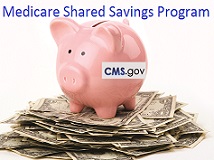 In December, the Centers for Medicare and Medicaid Services (CMS), and the Office of Management and Budget (OMB) published a lengthy notice of proposed rulemaking (NPRM) to improve the Medicare Shared Savings Program (MSSP). The National Association of ACOs (NAACOS) formulated comments in cooperation with some of the largest and most preeminent healthcare organizations in the country whose members include physicians, hospitals, medical group practices and nearly all existing Medicare Shared Savings Program (MSSP) ACOs. CMS has now released the final regulations governing the MSSP.
In December, the Centers for Medicare and Medicaid Services (CMS), and the Office of Management and Budget (OMB) published a lengthy notice of proposed rulemaking (NPRM) to improve the Medicare Shared Savings Program (MSSP). The National Association of ACOs (NAACOS) formulated comments in cooperation with some of the largest and most preeminent healthcare organizations in the country whose members include physicians, hospitals, medical group practices and nearly all existing Medicare Shared Savings Program (MSSP) ACOs. CMS has now released the final regulations governing the MSSP.
CMS is to be commended for engaging in a thoughtful process with stakeholders and adopting some important improvements to the program, especially for the new high risk Track 3. The most significant change from current rules for Track 1 is that the ACOs whose contract is ending this year and achieved certain quality thresholds will be permitted to sign a new 3-year agreement and if they were successful in lowering their costs and achieving savings, their new historically-based benchmarks will be adjusted upwards to include their savings amount. This will partially mitigate the spiraling down of benchmarks for the successful ACOs. We are very pleased CMS has adopted these changes to give the 200+ ACO whose contracts are ending an option to continue in the program. We are also very pleased that CMS will consider for the future, trending and resetting benchmarks based on regional costs. This was one of our strongest recommendations and we still hope it could be implemented in 2017 for all ACOs.
On the other hand, NAACOS is very disappointed many recommendations were not adopted for the majority (400+) of ACOs in the lower one-sided risk Track 1. While CMS made several other changes in how beneficiaries are assigned to the ACO and data is shared, the remainder of the MSSP program policies will not change for at least 2016 and probably 2017. Clif Gaus, CEO, commented that “we are pleased CMS has given ACOs an option to rejoin the program and has plans for future improvements but until further rulemaking, it will be a program materially unchanged from what it is now.”
With respect to the two-sided risk Track 2, there are few immediate changes but some improvements in future years are being considered. For the new risk Track 3, CMS is committed to adopting a number of significant policy improvements, but will not be in place until 2017. Track 3 will have better savings share, and in 2017, SNF 3-day waiver, Telehealth waivers and self-attestation/alignment of beneficiaries. These were strong recommendation made in joint stakeholder letters to CMS but the recommendations were for their adoption in Track 1 as well. We also are disappointed that CMS is not implementing a voluntary beneficiary assignment policy or a 2-way risk adjustment methodology for the Track 1 ACOs. By withholding these waivers and adjustments from Track 1, the chances for improved savings and quality are diminished.
Previously, we have argued that for the MSSP to succeed there first must be a sustainable business model for the one-sided track and most providers will not migrate to a higher two-sided risk track without a positive experience in a one-sided risk program. It would appear that CMS is hoping that by building the better business case for the higher risk tracks more ACOs will come. “I remain skeptical that enough improvements have been made to Track 1 to sustain the growth we have been seeing and am concerned that large numbers of current ACOs are not ready to take on the higher risks of Track 2, 3 or CMMI’s Next Generation ACO program”, said CEO, Clif Gaus. NAACOS believes that ACOs continue to be the most promising market-based solution to improving quality and lowering healthcare cost growth and will continue to work with the Administration and the Congress to make further adjustments to the program so that more Medicare beneficiaries and providers are able to participate and benefit from the program’s success.
About National Association of ACOs
NAACOS is a non-profit organization that enables accountable care organizations to work together to increase quality of care, lower costs and improve the health of communities. Our membership currently includes over 140 ACOs in 27 states, and our board includes ACO executives and experts from across the country.
